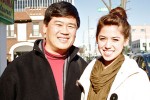Column Name
Title
Alum John Bruce Yeh is a 35-year veteran of the Chicago Symphony Orchestra, a founding member of the New York New Music Ensemble, a Grammy winner—and my dad. A native of Los Angeles, he began studying the clarinet at age 6 and spent two years at Juilliard, from 1975 to 1977, before leaving to assume the role of solo bass clarinetist with the C.S.O., and, two years later, assistant principal and solo E-flat clarinet. (He completed his bachelor’s in 1980.) Since then, he has released more than a dozen solo and chamber music recordings (including one with me!), soloed with numerous orchestras, including in the American premiere of Elliott Carter’s Clarinet Concerto, and won prizes at the Munich International Music and Naumburg Clarinet competitions.
Body
Unless he’s talking about politics, I am usually very proud to call him my dad. He’s also a big reason why I became a musician. Though I never ever wanted to play the clarinet, I was always drawn to classical music. At age 9, I chose to play percussion and I became serious about classical music in high school, when having a dad who could get my friends into the C.S.O. for free won me popularity points. In 2006, we performed together for the first time and gave the world premiere of Michael Burritt’s Duo Concertante for Clarinet, Percussion, and Wind Ensemble, which he wrote specifically for us. It was unforgettable.
And now, in the spirit of The Journal’s celebration of Juilliard families, here he is, the source of half my DNA.
—Molly Yeh (B.M. ’11, percussion) is the editorial assistant of The Journal.
Did you want me to go to Juilliard?
Yes, because that’s what you wanted to do.
Did you ever experience something at Juilliard and think, “if I ever have a kid at Juilliard, I hope they never have to experience this?”
No. All of my experiences that I remember were positive except for housing. I think kids have it a lot easier these days because there’s the dorm.
Were you hip to the party scene here?
My typical Friday night was dashing over to Carnegie Hall and making my way up to the dress circle back entrance, slipping the usher a dollar, and seeing and hearing some of the greatest orchestras ever.
What’s the most striking thing about being back in the building after all of these years?
So much of it, like the third and fourth floor, is exactly the way I remember it. And the flip side is that so much of it is so different, like the second floor. But it’s still the same atmosphere; it’s the same vibe around school.
O.K., let’s talk about your career. Do you ever want to quit?
Sometimes I say that, but not really seriously.
You always seem weirdly calm before a performance. You don’t get nervous, do you?
I get nervous before a performance but I channel the nervousness. It’s like, I know that it just means I can utilize that energy to make for a more exciting performance.
Do you ever feel like you missed out on anything after having won a job at such a young age?
I consider myself extremely fortunate, so what I did miss out on were things that I don’t really mind having missed out on, like playing in a small orchestra or playing in a number of different orchestras or freelancing. That sort of lifestyle does make a person more informed, though, so since I’ve [been] in the C.S.O., I’ve been able to branch out and have similar experiences.
If all of a sudden the C.S.O. decided to only play music that didn’t use the clarinet and you were forced to find a new job, what would you do?
I would seriously consider going into politics and being [an] elected official.
No comment! You’ve taken the audition for the principal spot in the C.S.O. four times now and you didn’t get the job. How did that feel?
It was a learning process because the first time we had that audition was 30 years after my original audition with the orchestra. I had to learn how to audition all over again and that’s a completely different art than playing every day in the orchestra. It was an experience that I went in to with all my energy, and I got a lot out of it.
Is your favorite part about your job that you get to sit in front of the percussionists?
Definitely. Today it was because we’re doing Mahler Six.
Do you have one particularly memorable experience?
The one I wish I could experience again was your recital when you played the Bartok Sonata and Berio’s Circles. That was among the very top musical achievements I’ve ever witnessed, and I was so proud of you. And it was in Room 309, which looks exactly the same as it did when I was there. Except I’ve never seen so much percussion equipment in one place at one time ever.
Do you have anything specific that you want to accomplish before you retire?
I’d like to play the Mozart Concerto in Carnegie Hall.





